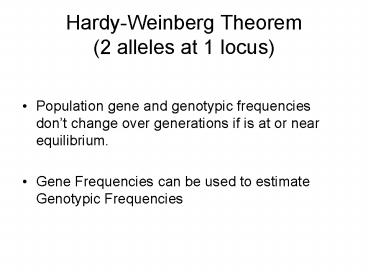HardyWeinberg Theorem 2 alleles at 1 locus - PowerPoint PPT Presentation
1 / 13
Title:
HardyWeinberg Theorem 2 alleles at 1 locus
Description:
Population gene and genotypic frequencies don't change over ... 37 red, 47 roan and 16 white. Co-dominance 3 categories. Allele freq. f(R) = p. f(r) = q ... – PowerPoint PPT presentation
Number of Views:25
Avg rating:3.0/5.0
Title: HardyWeinberg Theorem 2 alleles at 1 locus
1
Hardy-Weinberg Theorem (2 alleles at 1 locus)
- Population gene and genotypic frequencies dont
change over generations if is at or near
equilibrium. - Gene Frequencies can be used to estimate
Genotypic Frequencies
2
Assumptions for equilibrium
- large population (no random drift)
- Random mating
- no selection
- no migration (closed population)
- no mutation
3
Hardy-Weinberg Theorem (2 alleles at 1 locus)
- Allele freq.
- f(A) p
- f(a) q
- p q 1
- Sum of all alleles 100
- Genotypic freq.
- f(AA) p2 Dominant homozygous
- f(Aa) 2 pq Heterozygous
- f(aa) q2 Recessive homozygous
- p2 2 pq q2 1
- Sum of all genotypes 100
4
Hardy-Weinberg Theorem
- Allele freq.
- f(A) p
- f(a) q
- p q 1
- Sum of all alleles 100
- Genotypic freq.
- f(AA) p2 Dominant homozygous
- f(Aa) 2 pq Heterozgous
- f(aa) q2 Recessive homozygous
- p2 2 pq q2 1
- Sum of all genotypes 100
AA pp p2 Aa pq qp 2pq Aa
qq q2
5
Hardy-Weinberg Theorem
- X2 test used to verify if population is in HWE.
- Analyze/Compare differences between the observed
- and expected values
- Ho Observed not different than expected values
- Or observed differences are due sampling error (
not real differences)
- o observed value for a given category
- e expected value for that category
- ? Sum of the calculated value for each category
in the ratio
6
Hardy-Weinberg Theorem
- Reject Ho Observed Different Than observed
- Accept Ho Observed not Different Than observed
df degrees of freedom df categories - 1
7
Example Herd of 100 Short-horn. 37 red, 47 roan
and 16 white.Co-dominance 3 categories
Parental Generation. Observed Values RR 37 Rr
47 Rr 16 Total 100 Observed Allele
freq. f(R) p 2(37)(47)/2x .6050 f(r) q
2(16)(47)/2x .3950
- Allele freq.
- f(R) p
- f(r) q
- p q 1
- Genotypic freq.
- f(RR) p2 Homozygous RR
- f(Rr) 2 pq Heterozgous Rr
- f(rr) q2 Homozygous rr
- p2 2 pq q2 1
8
Example Herd of 100 Short-horn. 37 red, 47 roan
and 16 white.
Observed Allele freq. f(R) p .605 f(r) q
.395 Expected Genotypic freq. f(RR) p2 gt.605
x .605 .36603 f(Rr) 2 pq gt2 x.605 x
.395.47795 f(rr) q2 gt.395 x .395
.15602 Expected values RR p2 x n 36.603
Rr 2 pq x n 47.795 rr q2 x n 15.602
- Allele freq.
- f(A) p
- f(a) q
- p q 1
- Genotypic freq.
- f(AA) p2 Homozygous RR
- f(Aa) 2 pq Heterozygous
- f(aa) q2 Homozygous rr
- p2 2 pq q2 1
9
Hardy-Weinberg Theorem
Obs. Values Expect. values RR 37 RR
36.603 Rr 47 Rr 47.795 rr 16 rr
15.602 Difference Difference2 Dif2/Exp .397
RR .15761 0.0043 -.795 Rr .63203 0.0132 .398
rr .15984 0.0102 X2 ? .0277
- o observed value for a given category
- e expected value for that category
- ? Sum of the calculated value for each category
in the ratio
10
Hardy-Weinberg Equilibrium
X2 ? .0277
df degrees of freedom 3 categories df 3 -1
2 P between .9 and 1 Accept Ho gt Population in
HWE
11
Example 2 Population of 1000 Angus BB 605
Bb 313 bb 82. HWE?
Parental Generation. Observed Values BB 598 Bb
332 bb 70 Total 1000 Observed Allele
freq. f(B) p 2(598)(332)/2x1000 p 0.764
f(b) q 2(70)(332)/2x1000 q 0.236
Expected Genotypic freq. f(BB) p2
gt0.5837 f(Bb) 2 pq gt0.3606 f(bb) q2
gt0.0557 Expected values BB p2 x n
583.7 Bb 2 pq x n 360.6 bb q2 x n
55.7
12
Hardy-Weinberg Equilibrium
Obs. Values Expect. values BB 598 BB
583.7 Bb 332 Bb 360.6 bb 70 bb
55.7 Difference Difference2 Dif2/Exp BB 14.3
204.49 .3503 Bb -28.6 817.96 2.268 bb 14.3 2
04.49 3.6713 X2 ? 6.29
- o observed value for a given category
- e expected value for that category
- ? Sum of the calculated value for each category
in the ratio
13
Hardy-Weinberg Equilibrium
X2 ? 6.29
df degrees of freedom 3 categories df 3 -1
2 P between .05 and .01 Reject Ho gt Population
not in HWE































